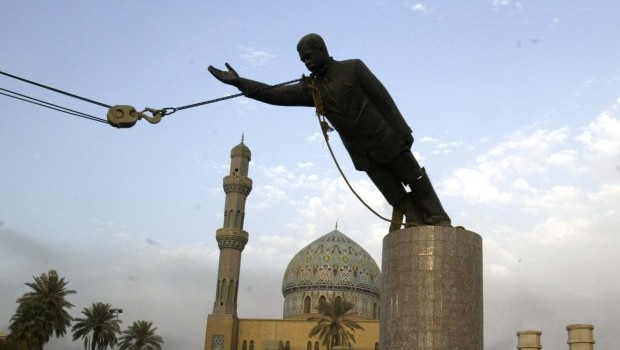The debate over the 2003 international intervention in Iraq is ongoing, and many people continue to express the view that the toppling of the Ba’athist regime by the US and its allies was an example of foreign occupation. Some of those espousing this view rely on the definition put forward by the UN Security Council, while others use the classical understanding of toppling regimes via foreign military intervention.
However, the majority of the Iraqi people cooperated with the international coalition to topple the regime, viewing this military intervention as part of the process of liberating a country that suffered more than three decades of Ba’athist rule. The Ba’ath in Iraq were a party that established a militaristic and chauvinistic regime based primarily on a totalitarian and sectarian ideology.
Saddam Hussein’s regime persecuted Shi’ites, Kurds advocates for democracy, and even the Sunni nationalists who put forward views that contradicted those of the Ba’athist authorities. His regime used all means of persecution against the Iraqi people—the violence was not limited to utilizing chemical weapons against Iraq’s own unarmed citizens in Halabcheh. Another example is the Al-Anfal genocide campaign against Iraq’s Kurds, which saw more than 100,000 Kurdish civilians killed. These Kurds were buried in mass graves, many of which remain undiscovered.
In addition to this, regime forces completely flattened approximately five thousand Kurdish villages. Hundreds of thousands of Iraqi Kurds, Shi’ites and Sunnis were forcibly expelled from Iraq, or had no choice but to emigrate to neighboring countries or to Europe. Ultimately, a single family was in control of the reins of power in Iraq and all the institutions of the state, and they looted all of the country’s wealth.
However, Iraqis continued to struggle to stop these inhumane and aberrant policies, and they—including the Kurdish political forces—tried to stay on the path of negotiation and dialogue with the regime. Their goal was to correct the country’s path and stop the bloodshed, the Kurdish genocide and the persecution of the Shi’ites. All such attempts were to no avail.
Facts and statistics have shown that the Iraqis were incapable of replacing the Ba’athist regime with one that believed in democracy, coexistence between the different components of society, and using the country’s material and human resources to establish an economic renaissance in line with Iraq’s potential. Unfortunately, many of the Arab countries and elites defended the regime and its crimes under false pretenses, motivated by Arabist and sectarian tendencies.
On the other hand, the ‘new world order’ that was established after the collapse of the Berlin Wall and the end of the Cold War changed many of the understandings that governed relations between states. It also affected the ability of despotic regimes to persecute their citizens and violate their human rights, as was occurring in Iraq under Ba’athist rule. The examples of bloodshed and mass genocide that could be seen taking place in different parts of the world confirmed that persecuted peoples were often unable to resolve their situation on their own, particularly as despotic governments enjoyed international legal protection in accordance with the concept of national sovereignty.
In other words, it was impossible for people to assert their rights against despotic regimes by themselves, without the intervention of the international community. Before the coalition forces intervened to stop the persecution of the Iraqi people, humanitarian intervention had had a number of successes—for example, benefiting the powerless people of Yugoslavia, not to mention other regions in the world. Humanitarian intervention was therefore a positive feature of this new era.
In addition to this, the failure of people to defeat dictators on their own gave new force to the idea of international humanitarian intervention. International intervention to save a people from persecution became an important pillar of international relations. This form of intervention is not colonialist in conception or implementation, including in Iraq where the coalition forces relied on participation from national Iraqi forces that supported the toppling of the regime. This was a positive intervention, and it included a strategy to return sovereignty and authority to the Iraqis themselves without imposing colonial rule—which is indeed what happened.
In the case of Iraq, the priority was to topple the regime and remove its evil oppression of large segments of the population. This was achieved when the international coalition entered Iraq and was welcomed by the majority of the Iraqi people. The moment that the regime was toppled was a moment of joy for all Iraqis, with the exception of the Ba’athists and their followers. This is because the people experienced and understood the meaning of “freedom” for the first time, and they thanked all those who helped them throw off their fetters. There is a very simple reason for this joy: prior to the liberation of Iraq, the Iraqi people truly felt that they had reached the end of the road and would never be rid of Saddam Hussein’s dictatorship. They had tried everything they could, and had sacrificed everything.
I believe that the majority of the Iraqis do not think about the meaning of words like “freedom” and “dignity” as much as they think and deal with the freedom and dignity they gained following the toppling of the despotic regime that was persecuting and killing them.
On the tenth anniversary of the collapse of the regime, I conclude my contribution to this debate by saying: Long live freedom!
